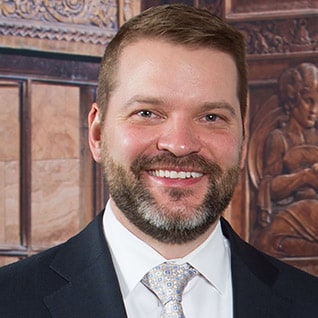From the director
 Great surgeons are trained, not born. The three key constituents of a strong surgical training program are high case volume, exposure to a wide breadth of pathology, and graduated autonomy – subtracting any one of these three will significantly compromise the fellowship experience.
Great surgeons are trained, not born. The three key constituents of a strong surgical training program are high case volume, exposure to a wide breadth of pathology, and graduated autonomy – subtracting any one of these three will significantly compromise the fellowship experience.
At our program, the fellow is immersed in a high-volume otologic and neurotologic practice. While complex lateral skull base training is the focus of the fellowship program, fellows also regularly participate in otologic surgeries including stapes surgery, chronic ear surgery, and cochlear implantation. We believe this is important because middle ear and mastoid surgery comprises a substantial volume of a neurotologist’s practice and many of the skills acquired during middle ear surgery transfer to skull base microsurgery.
Collectively, we evaluate approximately 200 new patients with vestibular schwannoma each year, perform 200 cochlear implant surgeries, and have a busy chronic ear practice. In addition to these principal cases, the expansive medical practice at the Mayo Clinic results in frequent surgical management of many rare systemic conditions that may affect the temporal bone and lateral skull base.
Finally, we provide graduated autonomy throughout the course of training. I ask our fellows maintain a detailed surgical log that catalogues case volume, case type, and level of involvement. During your interview, you will be given the opportunity to review these training case logs with the current fellows.
We are excited to recruit trainees who have a passion for neurotology and desire to contribute to the health and well-being of patients in both tertiary and community care settings. The fellowship program faculty and I are deeply invested in the success of each fellow and we continually strive to make this the best training program possible.
Thank you for visiting our website. I am excited you are interested in our program and encourage you to contact Ms. Sue Bisco, our fellowship program coordinator, or myself, if you have any questions pertaining to this fellowship opportunity.
Matthew Carlson, M.D.
Neurotology Fellowship Program Director
Professor of Otolaryngology and Professor of Neurologic Surgery
/prod01/channel_2/media/mccms/content-assets/academics/residencies-and-fellowships/neurotology-fellowship-minnesota/meet-the-faculty/matt-carlson-14787067-tile.jpg)
/prod01/channel_2/media/mccms/content-assets/academics/residencies-and-fellowships/neurotology-fellowship-minnesota/meet-the-faculty/mccms-neurotology-fellowship-3639221_MM_0010-tablet.jpg)
/prod01/channel_2/media/mccms/content-assets/academics/residencies-and-fellowships/otolaryngology---head-and-neck-surgery-res-mn/department-and-faculty/colin-driscoll-11406518-tile.jpg)
/prod01/channel_2/media/mccms/content-assets/academics/residencies-and-fellowships/neurotology-fellowship-minnesota/meet-the-faculty/brian-neff-md-14623242-tile.jpg)
/prod01/channel_2/media/mccms/content-assets/academics/residencies-and-fellowships/neurotology-fellowship-minnesota/meet-the-faculty/michael-link-md-10455272-tile.jpg)
/prod01/channel_2/media/mccms/content-assets/academics/residencies-and-fellowships/neurotology-fellowship-minnesota/meet-the-faculty/peter-weisskopf-md-16472021-.jpg)
/prod01/channel_2/media/mccms/content-assets/academics/residencies-and-fellowships/neurotology-fellowship-minnesota/meet-the-faculty/jamie-van-gompel-md-14518473-tile.jpg)
 Great surgeons are trained, not born. The three key constituents of a strong surgical training program are high case volume, exposure to a wide breadth of pathology, and graduated autonomy – subtracting any one of these three will significantly compromise the fellowship experience.
Great surgeons are trained, not born. The three key constituents of a strong surgical training program are high case volume, exposure to a wide breadth of pathology, and graduated autonomy – subtracting any one of these three will significantly compromise the fellowship experience./prod01/channel_2/media/mccms/content-assets/academics/residencies-and-fellowships/neurotology-fellowship-minnesota/meet-the-faculty/mccms-neurotology-fellowship-3847205_0002-tile.jpg)